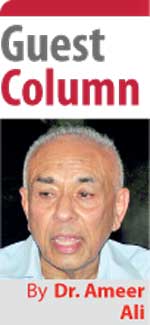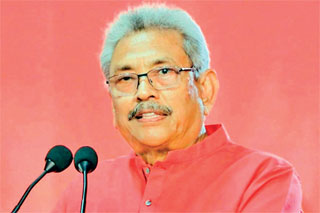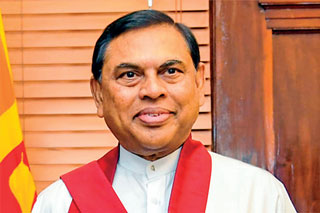Monday Feb 16, 2026
Monday Feb 16, 2026
Friday, 25 March 2022 23:23 - - {{hitsCtrl.values.hits}}
 With $ 7 billion debt to be serviced this year and another $ 25 billion between 2023 and 2026, the Government has formally written to IMF for assistance, ending thereby an era of two-year self-isolation from the West. “Subsequent to my discussion with the IMF, I have decided to work with them after examining the advantages and disadvantages,” said President GR when he addressed the nation.
With $ 7 billion debt to be serviced this year and another $ 25 billion between 2023 and 2026, the Government has formally written to IMF for assistance, ending thereby an era of two-year self-isolation from the West. “Subsequent to my discussion with the IMF, I have decided to work with them after examining the advantages and disadvantages,” said President GR when he addressed the nation.
He must have obviously found the advantages weightier than disadvantages, and, without saying so, had tacitly admitted the ignominious failure of his so-called ‘alternate path’ and homegrown solution.
In the meantime, the Minister of Finance had succeeded in signing a deal with India for a $ 1 billion credit facility with “no strings attached”, according to him. But, Ven. Elle Gunawansa Thero in a letter to GR has demanded full details of the deal be published. India’s total development portfolio till the end of 2021 amounted to $ 3.5 billion, of which $ 500 million was for grant projects. China is also reported to be considering extending a $ 1 billion financing facility with another $ 1.5 billion buyers’ credit. This is on top of an estimated $ 3.38 billion lent already to Sri Lanka.
These help from the two regional rivals are short-term palliatives and may temporarily enable the impoverished Rajapaksa regime to import certain desperately needed consumer items and replenish at least partially the empty shelves of local retail stores. It may help to calm down the raging public anger over chronic shortages, especially when the Sinhala-Tamil New Year festivities are fast approaching.
 |
| President Gotabaya Rajapaksa |
 |
| Minister of Finance Basil Rajapaksa
|
Ironically, and in the midst all economic difficulties endured daily by the masses, including deaths caused by standing for hours in queues to buy fuel, the UN-sponsored World Happiness Report found Sri Lanka advancing from a previously 129th position to 127th among a total of 146 countries, as a land of happiness to live in! One wonders whether there is something strange about the UN’s definition of happiness or in its methodology of computation. However, this finding may give some relief to a beleaguered Rajapaksa Government, which could probably trumpet this index as one of its grand achievements.
Among the three sources of assistance, while India and China are more interested in advancing their own interests at the expense of Sri Lanka, only the IMF at least has a theoretical duty to introduce measures that could inject financial discipline to a country that has been living beyond its means for decades. Sri Lanka joined the global neo-liberal economic order in 1977. In that order, the art of prudent economic and financial management is an essential criterion for a country’s successful competition and economic growth.
In Sri Lanka, almost all governments since independence have been noted for their indiscipline in budgeting. The idea of living within one’s means or balancing one’s budget seems to have disappeared from the dictionaries of governments. Today’s public debt is the cumulative effect of a series of deficit budgets. The magnitude of that deficit increased phenomenally since 2005.
The IMF’s first target therefore would be to help the country achieve macroeconomic stability in the medium to long-term. To do that it has to adopt a carrot and stick approach. IMF’s loans are usually cheaper than those from other sources, and the terms of repayment are also flexible. While extending a larger and longer-term loan, the IMF can also assist in restructuring Sri Lanka’s existing debt with the respective parties. In return for certain concessions, IMF’s interference would provide an official guarantee to lenders against any default by the borrower. That in turn would send a positive signal to foreign investors and credit rating agencies. In short, an IMF entry would help to raise international market confidence in Sri Lanka’s economy.
Against those carrots are the sticks. Tightening the country’s monetary policy to check inflation, raising taxes and reducing expenditure to improve public revenue, reducing excess burden on public sector employment, reforming public enterprises to turn them into profit making agencies and preferably privatising them, ending corruption and removing the power of the market mafia are some of the conditions IMF would expect the Government to fulfill. While insisting on these, the IMF would be prepared to work out a safety net for the poorer sections of the community who would inevitably suffer from the short-term consequences of these measures.
It is reported that the Government is preparing to hire an international legal firm to help negotiate with the IMF. What a shame! Is the country so bankrupt of legal talent? Even then, there are limitations to what the IMF could do. The toughest hurdles to cross are corruption and structural reforms. If corruption could be eradicated, that would automatically kill the power of influence by the mafia, and if structural reforms could be accomplished and public enterprises start earning profit, that would reduce the burden of taxes levied on the public. But it is in tolerating corruption and subsidising loss-making parastatals the regime could expect to remain in power. They are the pillars on which the reigning political structure is built. This crony capitalism would therefore limit the success of IMF reforms.
In addition to these hurdles there is also another: Sinhala-Buddhist ethnonationalism. This poison like malignant cancer saps not only the vitality of the economy but also the entire polity. No amount of IMF engineered macroeconomic stability could remove this. Its eradication has to come from the political arena. But given the shocking silence of all political parties in tackling this issue and their preparedness to play politics with it, the long-term prospects of an economically stable Sri Lanka remain bleak. Thus, abolishing crony capitalism, eradicating corruption and influence of mafia, and eliminating ethnonationalism set the limitations of IMF reforms.
(The writer is attached to the School of Business and Governance, Murdoch University, Western Australia.)